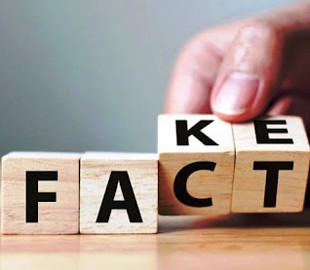
In the conditions of martial law in Ukraine, fake news has become a key tool of information warfare, which is actively used by the enemy to destabilize the situation in the country. The spread of false information can cause panic, undermine the morale of the population and reduce trust in state institutions.
What is the liability provided for in Ukraine for the spread of false information, in a commentary RBK-Ukraine Vadym Zavoritny, lawyer and head of the Dixie Lex Law Association, told.
According to him, in Ukraine, liability for the spread of fake news is provided for by both administrative and criminal legislation.
Administrative liability
The Code of Ukraine on Administrative Offenses (COA) in Article 173-1 provides for punishment for actions that may cause panic or disrupt public order. This is punishable by a fine of 10 to 15 non-taxable minimum incomes of citizens (as of today, 1 non-taxable minimum income of citizens is 17 hryvnias) or correctional labor for a period of up to one month with a deduction of 20% of earnings.
Criminal liability
Depending on the content and circumstances, the dissemination of false information may be classified under the following articles of the Criminal Code of Ukraine:
- Article 110 (encroachment on the territorial integrity and inviolability of Ukraine) – responsibility for actions that contribute to the violation of the territorial integrity of the country, in particular through manipulation or false information that undermines national security;
- article 111 (high treason) – punishment for assisting foreign states or their representatives in conducting hostile activities, which may include the dissemination of fake news aimed at destabilizing the state;
- article 111-1 (collaborative activities) – punishment for distributing appeals or expressing objections to an unspecified circle of persons, in particular on the Internet or through the media;
- article 114-1 (obstructing the lawful activities of the Armed Forces of Ukraine (AFU) and other military formations) – punishment for committing intentional actions aimed at obstructing the lawful activities of the Armed Forces of Ukraine or other military formations, spreading false information that disorients military personnel or citizens;
- Article 259 (knowingly false message) – provides for criminal liability for the dissemination of false information about a threat, usually this applies to cases when someone knowingly disseminates fake information about planting explosives, the threat of fire, terrorist attack, etc., which may lead to panic, destruction of infrastructure or other negative consequences;
- Article 436 (dissemination of war propaganda) – applies to persons who publicly call for aggressive war or for the resolution of a military conflict, as well as the production of materials with calls for such actions for the purpose of their distribution or the distribution of such materials;
- article 436-2 (justification, recognition as lawful denial of the armed aggression of the Russian Federation against Ukraine) – responsibility is formulated by actions consisting in the production, distribution of materials containing justification, denial, recognition as lawful the armed aggression of the Russian Federation against Ukraine, or the temporary occupation of part of the territory of Ukraine.
“Such violations can have serious consequences, different terms of imprisonment. They depend on the nature and severity of the offenses,” – Zavoritny noted.
How to fight fakes
In conditions of war, information security is an important component of national security. The lawyer emphasizes that the spread of fake news, manipulative information and propaganda is one of the tools of hybrid warfare aimed at destabilizing the situation within the country, undermining the morale of the population and weakening trust in state institutions.
In particular, much of such news is spread through social networks. Users can often read and share it without proper verification and critical analysis.
The lawyer emphasizes that every citizen can contribute to the protection of the information space. To do this, it is worth adhering to the following rules:
- check sources of information, giving preference to official and authoritative resources;
- analyze the style of presenting the news – excessive emotionality often indicates manipulation;
- use fact-checking platforms such as StopFake;
- refrain from spreading dubious news;
- be critical of information, even if it coincides with your beliefs.
Refuting false information and seeking redress
The protection of honor, dignity, and business reputation in Ukraine is closely related to the right to refute inaccurate information and the ability to demand compensation for material and moral damage. This issue is regulated by the Civil Code of Ukraine (CCU) and the Law of Ukraine “On Information”.
Article 277 of the CCU provides that an individual whose non-property rights have been violated due to the dissemination of inaccurate information about him or her family has the right to demand:
- refutation of the information by the person who disseminated it;
- response in the media, if the violation concerned printed or other media.
If the disseminator of the information is unknown, the affected person may apply to the court with a demand to establish the fact of inaccuracy and to obtain its refutation.
According to Article 280 of the Civil Code of Ukraine, individuals have the right to claim compensation for material and moral damage. However, the burden of proving the fact of causing damage and determining its amount lies with the plaintiff.
The court, when considering such cases, takes into account:
- the nature of the violation,
- the level of physical or mental suffering,
- the impairment of the victim's capabilities,
- the degree of guilt of the violator (if it is relevant).
According to Article 31 of the Law of Ukraine “On Information”, state authorities and officials Individuals have the right to demand only a refutation of false information. They cannot claim compensation for moral damages, even if the false information caused them reputational damage.

